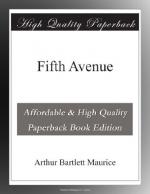“But it is the loss of old friends that hurts the most,” so the confidences went on. “There was Mulligan, for example, of whom I was speaking just now—he of the long coat and the dented brown derby hat. Far up, near the end of the line, there was an old one-story frame roadhouse, that had been there in my father’s time, in my grandfather’s time, in my great-grandfather’s time. Mulligan knew it well, and many the time, when he came out of it, he was swaying slightly, and had to pull himself up to the box by means of the seat rails. Then there were anxious moments, as we raced over the cobble-stones, and my wheels scraped other wheels to the right and left. In those days there was a strap, one end of which was attached to the driver’s boot, and the other end to the door at the rear. When a passenger wished to alight he pulled the strap and the driver released his hold. Sometimes the young bucks—we called them dudes in those days—inside had been dining well, and were hunting for mischief. Two or three of them would grab the strap and pull with all their strength. My sides are creaky now, but they ache with laughing when I recall how Mulligan used to swear. Sometimes the strap gave and sometimes the driver’ leg was twisted half off. Was that the origin of the expression ‘pulling his leg’? I wonder! The fare was dropped into the box up in front. At first the driver was the one who made the change. Later the change was handed out in sealed paper envelopes. Mulligan was of the early days. What became of him? Oh, he went into politics.
“I’ll tell you what you can do for me,” the exile went on. “Some day, when you are back in the old town just drop into the Hoffman House bar and take a drink for me, all the time looking up at the pictures of the lovely ladies about to go in bathing in a beautiful brook in the woods.”
“Stop!” said I, sternly. The piratical old plagiarist of a vehicle was about to begin filching from another source. There had been a guilty squeak in the voice that had roused my suspicions. “No doubt,” I said, with pointed sarcasm, “among the many passengers you carried at various times was the late Mr. Richard Harding Davis. He was a literary man of parts, and wrote, among other books, a charming little story called ’The Exiles.’”
“What! Is he d——? I mean I never heard of the gent,” was the brazen response. “There was a Davis, now, a Sebastian Davis, I think the name was, in the hair-oil business, if I am not mistaken. A little fellow, with mutton-chop side whiskers. But as I was saying, I don’t know anything better than Fifth Avenue at Madison Square of a summer’s night, with the hobos dozing already on the park benches, and people hanging round the entrance of the Fifth Avenue Hotel, and the men lined up three deep at the Hoffman bar, and the girls walking by on their way to dance the minuet at the Haymarket up at Sixth Avenue and Thirtieth Street. I said the minuet. Do you get me?” There was an evil chuckle. “Across the Square Diana is twinkling up there in the sky, and beneath, in the Garden, they are pulling off a middle-weight bout to a decision. Just round the corner, in the Madison Square Theatre, you can hear the clapping. The play is Hoyt’s ‘A Trip to Chinatown.’ Listen:




